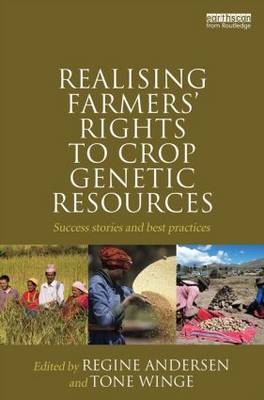
Realising Farmers' Rights to Crop Genetic Resources
Routledge (Verlag)
978-0-415-64384-9 (ISBN)
Farmers' Rights are essential for maintaining crop genetic diversity, which is the basis of all food and agricultural production in the world. The International Treaty on Plant Genetic Resources for Food and Agriculture recognizes Farmers' Rights and provides for relevant measures. However, implementation is slow, and in many countries there is resistance.
This book shows the necessity of realizing Farmers' Rights for poverty alleviation and food security, the practical possibilities of doing so, and the potential gains for development and society at large. It provides decision-makers and practitioners with a conceptual framework for understanding Farmers’ Rights and success stories showing how each of the elements of Farmers' Rights can be realized in practice. The success stories have brought substantial achievements as regards one or more of the four elements of Farmers' Rights: the rights of farmers to save, use, exchange and sell farm-saved seed; the protection of traditional knowledge; benefit- sharing; and participation in decision-making.
This does not mean that these examples are perfect. Challenges encountered on the way are conveyed and offer important lessons. The stories represent different regions and localities, including Europe, Asia, Africa and Latin America, as well as various categories of stakeholders and types of initiatives and policies.
Regine Andersen is a Senior Research Fellow at the Fridtjof Nansen Institute, Lysaker, Norway. Tone Winge is a Research Fellow at the Fridtjof Nansen Institute, Lysaker, Norway.
Part 1: Introduction 1. Crop Genetic Diversity and Farmers’ Rights 2. What Constitutes a Success Story in the Context of Farmers’ Rights? Part 2: Success Stories from the Realization of Farmers’ Rights to Save, Use, Exchange and Sell Farm-saved Seed 3. Norway’s Path to Ensuring Farmers’ Rights in the European Context 4. Conservation of Local Varieties in the Basque Country in Spite of Legal Restrictions 5. Combining Farmers’ Rights and Plant Variety Protection in the Indian Law Part 3: Success Stories from the Protection of Traditional Knowledge 6 Cataloguing Potato Varieties and Traditional Knowledge from the Andean Highlands of Huancavelica, Peru 7. A Community Registry in the Philippines Part 4: Success Stories from the Realization of Farmers’ Rights to Participate in Benefit Sharing 8. Participatory Barley Breeding in Syria 9. Benefiting from Diversity in Nepal 10. Community Seed Fairs in Zimbabwe 11. Farmer Innovation in Tigray, Ethiopia 12. Capacity Building and Farmer Empowerment in Mali 13. The Hiroshima Agricultural Gene Bank: Re-introducing Local Varieties, Maintaining Traditional Knowledge Part 5: Success Stories from Farmers’ Participation in Decision-making 14. Advocacy for Farmers’ Rights in Nepal Part 6: Ways Forward 15. Future Prospects for the Realization of Farmers’ Rights
| Zusatzinfo | 19 Halftones, black and white |
|---|---|
| Verlagsort | London |
| Sprache | englisch |
| Maße | 156 x 234 mm |
| Gewicht | 590 g |
| Themenwelt | Naturwissenschaften ► Biologie ► Botanik |
| Naturwissenschaften ► Biologie ► Ökologie / Naturschutz | |
| Recht / Steuern ► EU / Internationales Recht | |
| Recht / Steuern ► Öffentliches Recht ► Umweltrecht | |
| Recht / Steuern ► Wirtschaftsrecht ► Urheberrecht | |
| Weitere Fachgebiete ► Land- / Forstwirtschaft / Fischerei | |
| ISBN-10 | 0-415-64384-8 / 0415643848 |
| ISBN-13 | 978-0-415-64384-9 / 9780415643849 |
| Zustand | Neuware |
| Haben Sie eine Frage zum Produkt? |
aus dem Bereich


